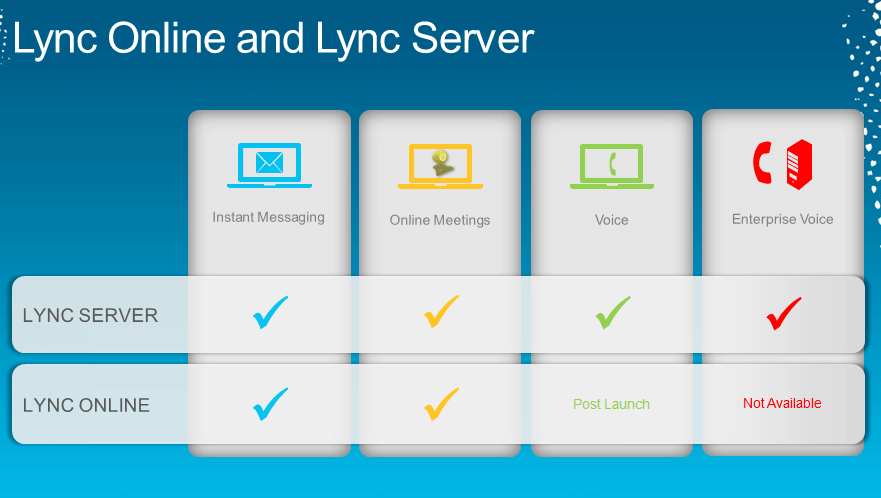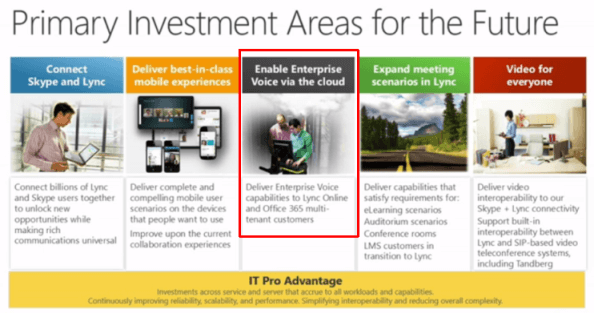Proof that cloud-hosted Lync enterprise voice is coming in 2014


It’s no secret that we run most of FireLogic’s day to day communication and file sharing needs off of Office 365, afterswitching from Google Apps late last year. Our entire team is using Exchange Online mailboxes for email. SharePoint and SkyDrive Pro act as our secure file server in the cloud. And Lync is the final piece of the puzzle that allows our in-office staff to stay in touch with techs in the field throughout the day, in addition to providing us with GoToMeeting-style web conferencing with clients.
But the biggest missing aspect from Office 365 in the way it handles Lync? A complete lack of integration with our VoIP phone system. We happen to fill that gap with RingCentral very nicely, which is a cloud-hosted VoIP provider that allows us to leverage a virtual PBX and route calls and voicemails to traditional desk phones, as well as our smartphones, no matter where we are. The company has been great for us, and we’ve been getting numerous customers onto the service so they could ditch their traditional expensive PBX systems.
I’ve always been a firm believer in streamlining services to as few providers as possible, both to cut down on feature disparity and having to retrain staff on more products. Not to mention the cost savings that generally accompanies “keeping it simple.” This was one of the biggest points I made in my article that explained why we left Google Apps: it’s about the ecosystem that Microsoft provides with Office 365; something that Google just isn’t getting yet.
While Office 365 is generally a great offering and most of its aspects are serving our needs well, Lync is probably my personal favorite. We’ve been using it in place of GoToMeeting for some time now and its feature set absolutely rocks. To be able to host 250 person webinars without having to pay the outrageous prices that GoToMeeting or Webex charge for these premium usage levels is just icing on the cake.
But as I mentioned earlier, Lync hosted by Office 365 (not the kind hosted internally with Lync Server 2013) has the one big disadvantage that it cannot be tied into your VoIP phone system. Other IT pros have reached out to me asking for providers that may be filling the gap since Microsoft has been taking its sweet time with this, and I did some considerable research on my own before we moved over to RingCentral in late 2012.

The above slide shot is from a TechEd 2011 presentation by Microsoft on where Lync stood back at the time, as covered by Mary Jo Foley of ZDNet. As you can clearly see, there is a feature disparity between Lync Online and Lync Server (on-premise). While voice capability has been around now for some time, enterprise voice or virtual PBX capabilities, have been kept silent by Microsoft ever since. (Image Source: ZDNet)
While I refuse to name names, for the sake of preserving the reputation of some of my competition, I will say that the landscape for hosted Lync right now is pitiful. There are only about 4-5 trustworthy vendors that are offering the service, and after spending some time speaking with all but one of them (one wouldn’t respond to my inquiries for more info; I think it was due to us being “too small” for their liking as a client) I can comfortably say I wouldn’t recommend the service to any clients. And as such, I have steered people clear, instead asking them to bite their tongues and go with RingCentral or 8×8 for their telephony needs — for now.
This service gap may be changing very soon. Two pieces of information that have been published in the last half year are silently pointing to a late 2014 launch for true Office 365-based enterprise voice (virtual PBX) capabilities that may finally allow us to tie in PSTN (public switched telephone network; aka regular phone service) after all. You would think more of the VoIP or Lync community would be vocal about this, but I guess these items have gone under the rug thus far.
First off is an article by Redmond Magazine from May 2013 that had quotes from Microsoft sources on Lync’s enterprise voice status. While the premise of the article was based around the reasoning behind Microsoft’s decision to kill off Lync Hybrid Voice (a short lived psuedo-VoIP offering that provided half of what a Lync Server setup offers — yes, it was terrible) there was also some juicy snippets that caught my eye. According to the piece, Microsoft has made it clear that they still have a “commitment to bringing enterprise voice capability to Lync Online and Office 365 by 18 months’ time.”
Microsoft’s semi-official Lync blog for the IT pro community, NextHop, also covered the demise of hybrid voice as an option as of May 13, 2013.
If you are curious about timeframe positioning for some context on that statement, that promise was supposedly made just before Microsoft’s Lync Conference 2013 which took place in February. Ironically, the 2014 Lync Conference is taking place about a month from now in late February. So if Microsoft’s statement still holds true, we are set for a Q3-Q4 2014 launch period for cloud-hosted Lync enterprise voice. I would be hard pressed not to see Microsoft making some further remarks about this offering at this year’s conference, as they are known for making big news at their partner events.
My second nugget of information that Microsoft let slip was via an IT-pro focused webcast on the Microsoft Virtual Academy site last October. It is simply titled “What’s New in Meetings and Collaboration in Lync” and was co-hosted by Brian Ricks and Aaron Steele. While the majority of the presentation was dedicated to going over new functionalities in Lync 2013, there was a small portion on Microsoft’s “vision” for Lync 2013 and beyond. Low and behold, smack dab in the middle of the slide, is a tile titled “Enable Enterprise Voice via the Cloud.” I took a screenshot in case you don’t want to watch the 90 minute webcast:

The 5-7 mins that was spent on the future areas of investment for Lync, which covered this blunt proof that cloud-hosted voice is coming, starts at about 40 mins into the video.
Does all of the above suggestive evidence mean that Microsoft is going to be releasing this functionality this year, as I am guessing? Perhaps not. But the writing on the wall is pretty darn convincing for me, as a longtime Microsoft watcher and IT pro:
- Lync Hybrid Voice was killed off fully in May 2013, as Microsoft wanted to pave the way for introducing a “cleaner approach” to voice via the cloud.
- Microsoft stated that they wanted to re-offer enterprise voice via the cloud in full within 18 months’ time as of the Lync Conference 2013 (held in Feb 2013 — which pits 18 months later at around Aug-Sep of 2014).
- The above webcast presented for IT professionals showed official Microsoft slide marketing material that is alluding to cloud enterprise voice for Lync as one of their biggest goals; and we can comfortably say that the preceding two goals of Skype integration and mobile device app penetration are on their way towards completion.
With Microsoft, I won’t believe it until I see it. But if what I’m hearing and seeing online via various venues is any indicator, we may be able to get Lync to take over for RingCentral rather soon. I’m holding my breath for this one.
Credit for Header Image: Oregon State
